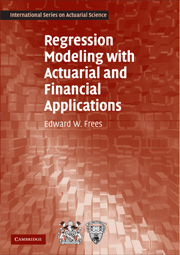Book contents
- Frontmatter
- Contents
- Preface
- 1 Regression and the Normal Distribution
- Part I Linear Regression
- 2 Basic Linear Regression
- 3 Multiple Linear Regression – I
- 4 Multiple Linear Regression – II
- 5 Variable Selection
- 6 Interpreting Regression Results
- Part II Topics in Time Series
- Part III Topics in Nonlinear Regression
- Part IV Actuarial Applications
- Brief Answers to Selected Exercises
- Appendix 1 Basic Statistical Inference
- Appendix 2 Matrix Algebra
- Appendix 3 Probability Tables
- Index
6 - Interpreting Regression Results
Published online by Cambridge University Press: 05 June 2012
- Frontmatter
- Contents
- Preface
- 1 Regression and the Normal Distribution
- Part I Linear Regression
- 2 Basic Linear Regression
- 3 Multiple Linear Regression – I
- 4 Multiple Linear Regression – II
- 5 Variable Selection
- 6 Interpreting Regression Results
- Part II Topics in Time Series
- Part III Topics in Nonlinear Regression
- Part IV Actuarial Applications
- Brief Answers to Selected Exercises
- Appendix 1 Basic Statistical Inference
- Appendix 2 Matrix Algebra
- Appendix 3 Probability Tables
- Index
Summary
Chapter Preview. A regression analyst collects data, selects a model, and then reports on the findings of the study, in that order. This chapter considers these three topics in reverse order, emphasizing how each stage of the study is influenced by preceding steps. An application, determining a firm's characteristics that influence its effectiveness in managing risk, illustrates the regression modeling process from start to finish.
Studying a problem using a regression modeling process involves a substantial commitment of time and energy. One must first embrace the concept of statistical thinking, a willingness to use data actively as part of a decision-making process. Second, one must appreciate the usefulness of a model that is used to approximate a real situation. Having made this substantial commitment, there is a natural tendency to “oversell” the results of statistical methods such as regression analysis. By overselling any set of ideas, consumers eventually become disappointed when the results do not live up to their expectations. This chapter begins in Section 6.1 by summarizing what we can reasonably expect to learn from regression modeling.
Models are designed to be much simpler than relationships among entities that exist in the real world. A model is merely an approximation of reality. As stated by George Box (1979), “All models are wrong, but some are useful.” Developing the model, the subject of Chapter 5, is part of the art of statistics. Although the principles of variable selection are widely accepted, the application of these principles can vary considerably among analysts.
- Type
- Chapter
- Information
- Regression Modeling with Actuarial and Financial Applications , pp. 189 - 224Publisher: Cambridge University PressPrint publication year: 2009

